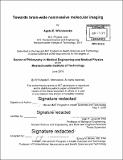Towards brain-wide noninvasive molecular imaging
Author(s)
Wiśniowska, Agata Elżbieta.
Download1119539081-MIT.pdf (7.263Mb)
Other Contributors
Harvard--MIT Program in Health Sciences and Technology.
Advisor
Alan P. Jasanoff.
Terms of use
Metadata
Show full item recordAbstract
An intricate interplay of signaling molecules underlies brain activity, yet studying these molecular events in living whole organisms remains a challenge. Magnetic resonance imaging (MRI) is the most promising imaging modality for development of molecular signaling sensors with deeper tissue penetration than optical imaging, and better spatial resolution and more dynamic potential in sensor design, compared to radioactive probes. MRI molecular sensors, however, have largely required micromolar concentrations to achieve detectable signals. In order to detect signaling molecules in the brain at their native low nanomolar concentrations, an improvement in MRI molecular sensors is necessary. Here we introduce a new in vivo imaging paradigm that uses vasoactive probes (vasoprobes) that couple molecular signals to vascular responses. We apply the vasoprobes to detect molecular targets at nanomolar concentrations in living rodent brains, thus satisfying the sensitivity requirement for imaging endogenous signaling events. Even with more sensitive probes, molecular imaging of the brain is further complicated by the presence of the blood-brain barrier (BBB), designed by nature to protect this most vital of organs. We have therefore implemented a means to permit noninvasive delivery of imaging agents following ultrasonic BBB opening. We use the ultrasound technique to deliver another potent class of contrast agents, superparamagnetic iron oxides, and we show that effective permeation of brain tissue is achieved using this approach. We have also designed ultrasensitive vasoprobe variants designed to permeate the brain completely noninvasively, using endogenous transporter-mediated mechanisms. We present preliminary results based on this approach and discuss future directions.
Description
Thesis: Ph. D. in Medical Engineering and Medical Physics, Harvard-MIT Program in Health Sciences and Technology, 2019 Cataloged from PDF version of thesis. Includes bibliographical references.
Date issued
2019Department
Harvard--MIT Program in Health Sciences and Technology; Harvard University--MIT Division of Health Sciences and TechnologyPublisher
Massachusetts Institute of Technology
Keywords
Harvard--MIT Program in Health Sciences and Technology.